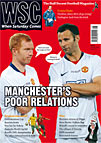 Huw Richards responds to Roberto Martinez's departure as manager of Swansea
Huw Richards responds to Roberto Martinez's departure as manager of Swansea
In WSC 269 I suggested that Swansea fans “would not swap Roberto Martínez for anyone”. It was incontestably true when written, but by the time of publication anyone reading Swans websites could reasonably have assumed that the club had instead been managed by somebody called Judas. Some of that abuse came from the traditional inability of many fans to grasp that, whatever a club is to them, it is an employer to a player or manager. It also, though, reflected what Martínez had come to mean to Swansea.
No other Swans manager has inspired such faith and affection. John Toshack was hugely admired and respected, but never terribly lovable. As a club Swansea has plenty going for it. It is well run and financially stable, with a strong supporters’ trust presence. The Liberty Stadium has transformed commercial potential. On-field progress measures out at 61 places in six seasons. That’s the achievement of a lot of people, but Martínez as manager was the perfect fit. Starting with the advantages of the popular ex-player he proved tactically sophisticated and astute and, in partnership with chief scout Kevin Reeves, adept at spotting and signing quality players at knock-down prices. Everyone who met him seemed to like him, and he enjoyed a rapport with both club and city.
That the football had echoes of the pleasing, and highly effective, style displayed by Spain at Euro 2008 and Barcelona in the Champions League wasn’t just our naturally biased view, but that of many opposing fans and players. Eighth in our first season in the top divisions since 1983 was punching way above our current weight.
Few doubted that Martínez was the key element in that over-performance. The hope for Swans fans was that he might be our Arsène Wenger or Dario Gradi – the long-serving manager who transforms his club’s culture and raises its status, all the time playing great football. Martínez, who further resembles Wenger as a man of evident culture and intelligence who yet has few interests outside football, may now regret that he encouraged this hope – recalling his contentious free transfer under Kenny Jackett and saying he’d “have to be thrown out again” to leave. As Toshack often says, “never say never”.
All of this fuelled reaction echoing the classic plaint of the jilted lover, “I thought you were different, but you’re just like all the rest” – in football terms greedy, self-seeking and faithless. That he went to Wigan, though, argues otherwise. Wigan were derided by one web poster as “one of those clubs whose sole ambition is to stay in the Premier” – fairish comment, but ignoring the fact that’s a status to which the Swans aspire.
There’s probably no less promising assignment among the 20 clubs who finished between Swansea and the European qualifiers last season. Wigan look to be at the realistic limit of their potential, have the smallest gates in the Premier League and are perilously dependent on Dave Whelan’s largesse. Had Martínez simply wanted more money and Premier League status, he might easily before long have done better for himself than the club he chose.
But Martínez played for six years at Wigan and remained close to Whelan. It was, because of that rival, longer-established emotional connection, always the wildcard among the threats to Swansea keeping him. He chose them rather than us. That hurts, but hardly makes him Judas. Compounding the hurt, though, is the real fear that by leaving and taking his assistants – in particular Reeves – Martínez will undo his achievements at Swansea. The cut-rate Barça could become any other Championship struggler. If players follow him to the JJB – as an Espanyol loanee, Jordi Gómez does not count – feelings will harden.
His successor Paulo Sousa is hard to judge as a manager on the strength of a few months in the madhouse at QPR. What does encourage faith is the recent record of the Swansea board in picking managers. The last three appointments – Brian Flynn, Jackett and Martínez – have been terrific. Each was right for the club at the time and left us much better than they found us.
Huw Jenkins may just emerge as the latest in a long line of Swans idiosyncrasies – the chairman as folk hero – for the skill with which he played a difficult hand, extracting compensation from Wigan for both Martínez and the rest of his backroom team. We can but hope that he’s also retained the knack of choosing the right man to succeed him.
From WSC 270 August 2009